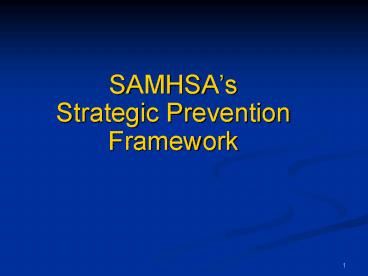SAMHSAs Strategic Prevention Framework - PowerPoint PPT Presentation
1 / 19
Title:
SAMHSAs Strategic Prevention Framework
Description:
State Prevention Systems and the Single State Authority ... Prevention System Leadership Group brings together the top-level decision makers ... – PowerPoint PPT presentation
Number of Views:134
Avg rating:3.0/5.0
Title: SAMHSAs Strategic Prevention Framework
1
SAMHSAs Strategic Prevention Framework
2
SAMHSAs Strategic Plan
VISION A Life in the Community for Everyone
MISSION Building Resilience and Facilitating
Recovery
ACEthe basis of SAMHSA programs
ACCOUNTABILITY
CAPACITY
EFFECTIVENESS
3
The Role of Prevention
- To create communities in which people have a
quality life - healthy environments at work in school
- supportive communities and neighborhoods
- connected to families and friends
- ATOD and crime free
4
Substance Abuse is LOCAL
- The federal government and states should
implement systems to support communities in
reducing substance abuse and related problems. - Every community needs a comprehensive community
wide plan---the community is the unit of analysis.
5
State Prevention Systems and the Single State
Authority
A servantleadership role positioned to support
the growth of community prevention systems by
- Creating and participating in a State prevention
system (which includes Governors office,
legislature, other agencies) - Providing resources, capacity building, and tools
necessary for communities to achieve targeted
community change
State success is dependent on community success!
6
State Prevention System
- Prevention System Leadership Groupbrings
together the top-level decision makers across
agencies and the Governors office to provide
direction - Workgroupsbring together agency-specific staff
involved in each area for common development and
alignment of system functions
7
State Prevention System (continued)
- Workgroups
- Epidemiology Workgroupcollects and distributes
appropriate data - Capacity Workgroupidentifies skills and
processes needed to do comprehensive planning
(community training and TA) - Strategies Workgroupidentifies evidence-based
policies, practices, and programs that make sense
for communities
8
Community Prevention Systems
- Bring the power of individual citizens and
institutions together - Create a comprehensive plan that everyone in the
community has a stake in and owns - Foster continued systems approaches as the
community experiences the outcomes of its
investments - Hold community institutions accountable
9
Focus for States and Communities
- Consumption and consequences (prevent the problem
associated with use) - Across the lifespan (not just youth)
- Based on evidence-based research and empirical
data - Outcomes measured at the population level (not
just program level)
If we prevent use, we prevent the problem!!
10
Strategic Prevention Framework
- Community development
- Strategic planning
- The change process at the State and community
level
11
Key Principles of the SPF
- Public Health Approach
- Follows a Strategic Planning Process Use Data
throughout the process to inform decisions - Outcomes Based Prevention
12
Public Health Approach
- A public health approach focuses on change for
entire populations/communities - Population-based public health considers an
entire range of factors that determine health.
13
Outcomes-based prevention
- Effective prevention is grounded in a solid
understanding of alcohol tobacco and other drug
consumption and consequence patterns. - Documenting the nature and extent of consumption
(e.g., underage drinking) and consequences
(motor-vehicle crashes) at the start is critical
for determining intervening variables and
aligning strategies to address them.
14
Outcomes-Based Prevention
Substance abuse related problems
Intervening Variables
Programs, Policies Practices
Planning, Monitoring, Evaluation and Replanning
15
SAMHSAs Strategic Prevention Framework Steps
Assessment
Evaluation
Capacity
Planning
Implementation
16
The SPF and Cultural Competence
- Why cultural competence?
- To eliminate service and participation
disparities for people of diverse racial, ethnic,
and linguistic populations, as well as,
consideration of gender, disabilities, and sexual
orientation. - To improve the effectiveness and the quality of
the programs, policies and practices chosen to
achieve, outcomes in targeted populations.
17
The SPF and Cultural Competence
- To add to the body of knowledge, awareness and
skill in the design, implementation, and delivery
of prevention programs, policies, and practices. - To promote the philosophy that an effective
program is a culturally competent program across
the board, i.e., agency, policies, staff, and
programs/practices.
18
Sustainability
- Sustaining outcomes, not programs
- Think sustainability from the beginning
- Look to the system to sustain outcomes
- Sustain prevention by making it everyones job!
19
The Strategic Prevention Framework
- Prevention is a Continuum Prevention extends
from deterring diseases and behaviors that
contribute to them to slowing the onset and
severity of illnesses when they do arise. - Prevention is Prevention is Prevention The
mechanisms of prevention are the same whether the
target is on changing social, environmental or
biological factors for many diseases. - Successful Prevention Decreases Risk Factors and
Enhances Protective Factors The same risk
factors affect many health issues from
depression and substance use to heart disease and
diabetes. Other factors can protect against
these health problems. The goal to reduce risk
factors and enhance protective factors that can
compromise health. - Prevention Requires Adoption of Known Effective
Prevention Practices Within a Framework That
Works Research and experience have produced
highly effective prevention programs to reduce
risk factors and promote protective factors. - Systems of Prevention Services Work Better Than
Service Silos The best prevention results from
partnerships without collaboration, even the
best prevention efforts will not leverage
collective resources and can miss achieving their
potential. - Common Data Sets Across Service Systems Can Help
Asses Prevention Efficacy and Promote
Accountability Solid evaluation can help assess
programs effectiveness and the value of
engagement across service systems. - Recognizes the importance of States and
communities- Coordinating funding and developing
infrastructure. - Comprehensively address Substance Abuse - Through
multiple strategies across multiple sectors with
both the public and private sector resources.































